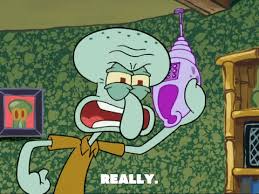
An easy yet effective way to tighten your writing and boost its impact is to examine all your adjectives and adverbs with a critical eye. You’ll find that many can be rewritten or even removed without any damage to your message.
First, a quick grammar review: Adjectives are words that describe nouns (persons, places, or things), such as “big,” “little,” color words, characteristics such as “hairy,” “interesting,” “unusual,” and so on.
Adverbs describe verbs (action words), adjectives, or even other adverbs. Many adverbs are easy to spot because they end in -ly – such as “really,” “quickly,” “carefully”…you get the idea. However, watch out one extremely common adverb that doesn’t end in -ly: “very,” which can almost always be rewritten or cut.
For example:
Spongebob lives in a really big yellow pineapple, next door to his good friend Patrick’s rock.
First, let’s identify the adjectives: “big” and “yellow” describe “pineapple,” and “good” describes “friend.” We have just one adverb – “really” – which describes the adjective “big.”
In this sentence, you can cut “really.” An even better edit would be to change “really big” to a single word that captures the same idea, such as “huge” or “giant.”
You don’t need “yellow” because pineapples usually are yellow. But if Spongebob someday decides to paint his house blue, that would be worth including, since that’s unusual.
The adjective “good” for “friend” is probably unnecessary, except maybe if you’re drawing a comparison between Patrick and another one of Spongebob’s friends.
So a good rewrite of this sentence might look like:
Spongebob lives in a huge pineapple, next door to his friend Patrick’s rock.
How about another one:
Squidward constantly gets tired of all the very loud noise that Spongebob and Patrick make when they play funny, silly games.
Again, where are the adjectives? “Loud” describes “noise,” and “funny” and “silly” both describe “games.” And the adverbs? “Constantly” describes “gets tired,” and “very” describes “loud.”
Considering “constantly,” this is another case when a rewrite of the whole phrase is a good solution. Instead of “constantly gets tired of,” how about something like “is fed up with”?
Saying that “noise” is “loud” is redundant. And the addition of “very” puts this phrase over the top. Again, look for one precise word that captures the entire idea, such as “ruckus.”
Finally, you don’t need both “funny” and “silly” to describe the games – pick whichever one you want to emphasize more.
So this sentence could be rewritten:
Squidward is fed up with all the ruckus that Spongebob and Patrick make when they play silly games.
These are examples which I made obvious in order to make the point, but if you start giving your adjectives and adverbs a critical eye, you will spot areas where you can hone your wording to make it more precise.
As you find examples “in the wild,” either in your own writing or elsewhere, please share them in the comments. And as always, if you have any questions, please contact me at steph@tightprose.com!

